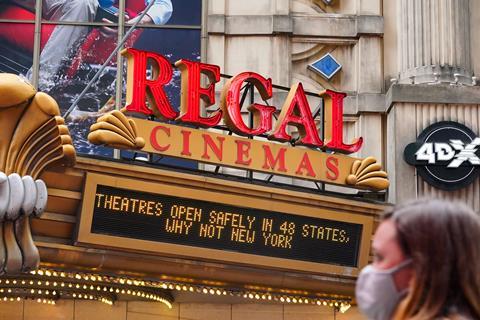
UPDATE: As Cineworld files for Chapter 11 bankruptcy protection in the US, the financial woes of the world’s second largest exhibitor place a huge question mark over the future of Regal Cinemas, its US subsidy that operates more than 500 venues and 7,000 screens across the country.
Mooky Greidinger, the feisty CEO of the company whose debt load and lease liabilities run close to $9bn, has been huddling with his top lieutenants to find a way out of a nightmare confluence of events.
As with theatre chains everywhere, Cineworld executives are dreading a lull in post-summer cinema-going until Black Adam and Wakanda Forever arrive in October and November, respectively. In August the company said admissions had fallen short of expectations, casting a shadow over liquidity.
On top of that the company has debts accrued during a punishing pandemic when sites went dark for many months, as well as the prospect of a $965m (CAD $1.2bn) payout ordered by an Ontario judge last December after Canadian exhibition leader Cineplex successfully sued Cineworld for pulling out of a merger.
Greidinger is appealing the ruling and said his company acted properly in its dealings with Cineplex. The Canadian appellate courts are expected to start hearing the case in October. Some have argued the Cineworld CEO went too far in his pursuit of the Canadian giant after having bought Regal. One Hollywood studio source says he “got greedy”, adding: “Even if that judgement was cut in half, it’s still $500m that he doesn’t have.”
Chapter 11
A Chapter 11 bankruptcy filing in the US does not necessarily mean a quick sale and liquidation, although that can be an outcome.
“The process is usually focused on reorganising and right-sizing the capital structure so that the company can continue in some form,” says Kyle Ortiz, a partner and restructuring attorney at Togut, Segal & Segal LLP, a New York boutique that specialises in restructuring.
“From the very get-go, there is what we call first day relief so that you can continue to pay wages and honour customer programmes, pay insurance and pay taxes.”
Cineworld would need to agree on a plan of reorganisation with its creditors and get that approved by the creditors in court to dictate the business going forward, adds Ortiz, who serves as co-chair of the international committee at American Bankruptcy Institute.
For an exhibitor the bankruptcy filing would enable it to look at its leases and decide which ones to assume and which to reject, a step that would bring much-needed savings for a beleaguered operation. Without revenue from ticket sales at the height of the pandemic and facing huge rent payments, Cineworld would have been spending millions of dollars a month just to get by. “You can’t sustain yourself,” notes another Hollywood source.
Approved bankruptcy plans activate a payment “waterfall”, as Ortiz describes it. “You only can get the first dollar down the waterfall if the levels above have been paid in full. So secured creditors have to be paid in full and then all of the general unsecured creditors would have to get paid in full before equity would get something, unless there’s some sort of agreement and those other parties have agreed.”
Bankruptcies involve cash-strapped companies, so equity investors tend to get wiped out if there aren’t sufficient funds left to pay them once the higher tiers have been made whole.
“Often equity is given to the former lenders in an effort to pay them down and they often will be interested in taking essentially debt for equity as a way of restructuring,” says Ortiz, who adds: “You’re basically handing the company over to the lenders in those sorts of situations.”
The future of Regal

Opinions are divided over what this could all mean for Regal.
“My suspicion is he’s probably thrown in the towel on Regal even though he says everything to the contrary, and he’s trying to save Cineworld and retreat back to Europe, the UK, European territories and Israel,” opines the Hollywood executive cited first in this piece.
In theory Cineplex could get Regal, which would be a way for Greidinger to slash his debt. Such a move may not appeal to the Canadian company and would require it to invest significant resources and then deal with irate landlords who were not paid for stretches of time during the pandemic.
AMC, the world’s largest exhibition circuit, has endured challenges of its own and may not have an appetite to further expand its market-leading footprint. Similarly observers say Cinemark, the third largest group in the US, is viewed as a smart, conservatively run company that would not countenance such a move.
“This industry, even as challenged as it is, has never had a shortage of people that see opportunities in distressed properties,” the executive said. “I would assume since Regal was taken off the US markets – it’s a private company for all intents and purposes – there could be a private equity company out there that would look at the books and figure out what they can get out of it.”
However another Hollywood executive believes Greidinger will keep his US operation. “I don’t think they get spun off,” he says. “I would imagine that through the bankruptcy proceeding the banks will take over ownership and operation of the theatres and they’ll keep current management in place.”
He continues, “I do think there are units here and there that are depreciated and old and quite frankly need to close or get operated in different ways as a discount house or maybe go through a renovation.”
While the industry awaits Cineworld’s next move and the Cineplex appeal hearing, Screen understands studios and distributors will continue to provide films to Regal venues. Who will own Regal and what the circuit will look like come next year is another matter.
When contacted for comment by Screen, Cineworld referred us to their regulatory filing from August 22.






![The Brightest SunScreen[Courtesy HKIFF]](https://d1nslcd7m2225b.cloudfront.net/Pictures/274x183/3/5/0/1448350_thebrightestsunscreencourtesyhkiff_312678.jpg)


















No comments yet